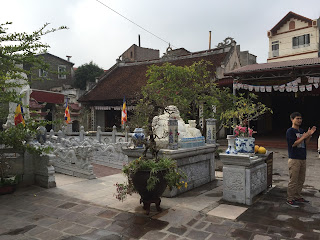We were off to the bus by 8:30 a.m. and on our way to another village just outside the city. As the village yesterday specialized in rice paper, this village specializes in pottery. Just about everyone who lives here makes his/her living in some way connected to ceramics.
The bus unloaded us at the scene of yet another wedding. Apparently Monday was also an auspicious day, though unlike Sunday, a work day for most people.
Our first stop was a Buddhist pagoda for a lesson on religions of Vietnam. Our guide tried valiantly to get across the concept that Buddhism from India, and Taoism from China, had both come to Vietnam at roughly the same time, about 1800 years ago. These had fused with native animism to create a highly syncretized religious practice, strongly influenced by Confucianism. The questions from the group indicated less than complete understanding.
We walked on through winding, narrow streets until we were welcomed into the shop of a potter. This man's main contract is to produce bottles for a Russian vodka. He uses a mold process to turn out about 4,000 identical glazed ceramic bottles every month. This process was demonstrated for us, start to finish, and it is quite labor-intensive.
Next, our host demonstrated his skill at the potter's wheel, showing us how eight generations of potters before him had plied their trade. He made it look very easy. But when he set each of us in front of a wheel and gave each a lump of clay... well, let's just say that Mary and I were better at rice paper (though Mary actually turned out something that didn't still look like a lump of clay).
The group took turns washing up, though some wore clay splatters on their clothing the rest of the day. Then we moved on down the street to a grand house in French style occupied by Mr. & Mrs. Duc, a charming retired couple in their 70s. The dominant feature of the first room of the house is a huge shrine to their ancestors, ornately decorated.
After some initial pleasantries, we were ushered through to a courtyard which offered a better perspective on the architecture of the house. It was a fusion between traditional Chinese and a grand French maison. Though beautiful, it could have used a coat of paint, and the doors and window frames were showing considerable wear.
We were moved back inside to a parlor furnished with exquisite antique Chinese lacquered, carved woodwork with gorgeous inlaid mother-of-pearl, where we were served tea. Mr. Duc spoke (with our guide translating) of the "land reform" of 1954, when Ho Chi Minh's government seized this house and much land from his parents. He had been sent to live with an uncle, while his father was imprisoned. The house had later been returned to the family, though they received only about $100 in compensation for the land.
Mrs. Duc proudly told of the awards she has won for her cooking, and also provided an account of their arranged marriage. As our guide pointed out, the Duc's are examples of the fundamental optimism of the Vietnamese people. After all their family suffered, they continue to count their blessings and look forward.
 |
| Front gate to the Temple of Literature |
Returning to the hotel, we opted for an evening of relaxation and packing for our departure from Hanoi tomorrow morning.








No comments:
Post a Comment